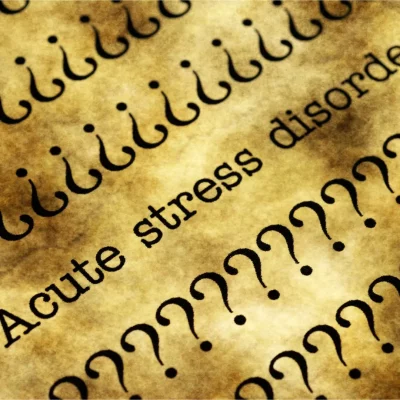What is Acute Stress Disorder?
Similar to PTSD, acute stress disorder [ASD] is a psychiatric disorder that may develop following involvement in or witnessing of a traumatic event. An estimated 5% to 20% of people exposed to traumatic events, such as assault, an accident, or war, develop acute stress disorder. About half eventually develop post-traumatic stress disorder (PTSD). Surveys shows that approximately 33% of mass shooting survivors, 16% of assault victims, and 12% of those who have experienced a car accident have developed some form of acute stress disorder. Outside of experiencing a traumatic event, various risk factors may affect the development of ASD, such as:
- biological sex
- age
- stress
- substance
- coping mechanisms
Signs and Symptoms
In general, symptoms of acute stress can form within days, weeks, or even months of the traumatic event. Symptoms should disappear with proper treatment. However, symptoms that persist for more than 30 days or worsen over time may be an indicator for the development of PTSD. Common symptoms of acute stress disorder are:
- heart palpitations
- difficulty breathing
- chest pain
- head or stomach ache
- or nausea.
Those with acute stress disorder may also face psychological symptoms such as:
- intrusions [involuntary flashbacks or nightmares]
- dissociation [feeling dazed, altered perception, or feelings of being outside the body]
- arousal [inability to focus, disturbances with sleep, or angry outbursts]
- or an overall negative mood
Though symptoms may be clear, it is necessary to be diagnosed by a professional.
Treatment Of Acute Stress Disorder
Treatment of ASD typically takes the form of therapy, with cognitive behavioral therapy [CBT] acting as the typical first-recommendation for treatment. CBT works to combat ASD by helping the patient become more aware of their thought patterns and behaviors. They can then work with their therapist to adjust them. Most often, therapy begins approximately two weeks after the traumatic events and lasts through six weekly sessions averaging at about 60 to 90 minutes each. Mindfulness techniques are also recommended for lowering symptoms of ASD. These practices include meditation and breathing techniques. Many doctors generally advise against medication in treatment for ASD. Although your doctor may prescribe an anti-depressant.
How Can Makin Wellness Help?
Makin Wellness providers are skilled in the treatment of ASD through CBT. We strive to help our clients overcome their mental disorders and always put our clients’ well-being first. If you or someone you know may be suffering from acute stress , visit our website or email us at [email protected] to schedule an appointment.
Begin your healing journey. We accept all commercial providers, including: Highmark, UPMC, United, and Aetna. Not currently accepting Medicaid, Medicare, or UPMC for You.
Serena Daywalt
Serena Daywalt
B.A. Psychology Major | Point Park University
Research Psychology Intern | Makin Wellness, Downtown Pittsburgh
Events Coordinator and Advocate | PPU Strong Women, Strong Girls
Mentor and Academic Events Coordinator | PPU Honors Student Organization








